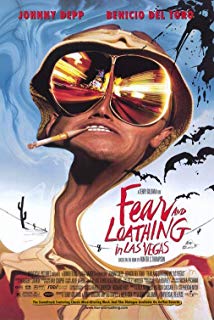電影訊息
賭城風情畫--Fear and Loathing in Las Vegas
編劇: Hunter S. Thompson 泰瑞吉廉 亞歷寇克
演員: 強尼戴普 班尼西歐岱托羅
恐惧拉斯维加斯/赌城风情画/赌城情仇
導演: 泰瑞吉廉編劇: Hunter S. Thompson 泰瑞吉廉 亞歷寇克
演員: 強尼戴普 班尼西歐岱托羅
電影評論更多影評

2007-02-01 01:51:55
迷幻
因為喜歡特里 吉列姆 (泰瑞 Gilliam) 也喜歡強尼 德普 (Johnny Depp) 所以很久前 收藏了Fear and Loathing in 拉斯維加斯 ,他們倆合作的片子
終於在這個陰冷的下午 正如片頭 johnny陳列的各種各類迷幻藥: 大麻 LSD 古柯鹼....正如充斥整片的搖晃,狂亂,荒誕,離奇的鏡頭所讓人暈眩迷亂的,我不知不覺的吞下了這片迷幻藥
也許還因為片頭就出現的那個留著長髮白嫩的像個gay的搭車人-----就是日後成為spider man的托比 馬圭爾 (Tobey Maguire)演的...
記者杜克和他的律師朋友——剛左博士(Dr.Gonzo)一起旅行,來到拉斯維加斯去尋找它們的「美國夢」。他們戴上大量的毒品和酒精,準備在路上享用。在路上,他們遇到形形色色的人,警察、記者、賭徒、比賽者和搭便車人。他們尋找的不確定的「美國夢」,最後由於毒品和酒精而演變成充滿恐懼和憎恨的噩夢
能感受到講述的是美國60 70年代大背景下的那種頹廢與傾跨,甘迺迪遇刺,越戰,嬉皮士,即使主角如何在藥物中癲狂迷醉,這些內容也都無時無刻尖叫著,魔幻著以各種形式侵襲過來------電視,音樂,幻覺..等等
這種荒誕似乎很難引發一個21世紀中國青年的共鳴....但卻為其中的台詞所吸引
History is hard to know, because of all the hired bullshit, but even without being sure of "history" it seems entirely reasonable to think that every now and then the energy of a whole generation comes to a head in a long fine flash, for reasons that nobody really understands at the time — and which never explain, in retrospect, what actually happened.
不禁會想到現在上點年紀的人總會忍不住跟我們年輕人講述中國60 70年代的癲狂迷離,感嘆這個國家,這代人的不幸等等.
其實放眼望去,6,70年代的癲狂似乎是全體人類,整個世界的癲狂:冷戰....世界貿易....文化碰撞...解放....
美國---越戰、嬉皮、搖滾樂、雅皮(國際青年黨)、學運、藥物文化、反戰、婦女運動、性解放...
歐洲------蘇聯的鐵幕....東西德的牆瓦....東歐各國政權日夜交替似的變更,分裂,爆破,還有法國的紅色巴黎...那像毛主席致敬的學生運動
(如果看過的話
中東----七次戰爭...耶路撒冷的嘆息牆..離神最近的地方 也展開著最血腥,最野蠻的廝殺
非洲似乎也在各殖民地要求獨立的槍炮聲中慢慢醒來,在血與火中掙扎,曼德拉,伊迪·阿明...
歷史的洪流總讓人深處其中而不知所措,後知後覺 二戰後 人類文明傷口的迸裂與鎮痛 一痛就是二三十年...
比起人類古代的蠻荒與無知 現代文明的冷靜與清醒 才使這一切讓人無比撕裂的癲狂迷亂 賢者與暴君 憤青與殺戮...古老而輪迴的歷史命題..
也許扯遠了 但正如台詞所說nobody really understands at the time — and which never explain, in retrospect, what actually happened.
真正發生了什麼 沒有人知道 歷史一經回味 就是片讓人精神錯亂的迷幻藥
我很難理解johnny depp堂堂風流帥哥 竟然在此片中 是個禿頭....還叼著帶菸嘴的香菸, 扭曲著走著羅圈腿般的步伐
但這真的不是一部普通的電影 他來自於70年代最暢銷的同名小說 小說來自真人真事 而這個真人又是滾石歷史上最著名的記者,剛左新聞締造者,極富傳奇色彩的人生經歷,被稱為「Blog精神之父--Hunter S. 湯普生
引用段資料
湯普森死後,西方媒體多將剛左新聞主義的詞源歸於《賭城恨憎》裡面的薩摩亞律師剛左博士,但gonzo.org(小心!不要誤入gonzo.com)的創辦者克里絲汀·奧西蒂斯(Christine Othitis)在其文章《剛左新聞主義的發端與觀念》中說,gonzo來自湯普森的朋友比爾·卡多索的一封信,是加拿大法語gonzeaux一詞的誤拼。
誤拼也好,自創也罷,反正gonzo已經進入了《牛津英語詞典》。性、毒品、暴力、體育和政治,特別是搖滾樂評,都是典型的剛左寫作主題。在「剛左新聞主義」之中,沒有預先設定的規則。「剛左新聞」將事實與虛構,真實與想像,藉助毒品、藥物和酒精的作用混為一處,作者主觀的虛構和想像,作為自我體驗的一部份,都成了新聞作品中加以報導的事實。湯普森說,一個好的剛左記者,「需要大記者的才華,畫家/攝影家的眼光,以及演員的多變」,剛左的報導風格「基於福克納的思想,即最好的小說遠比任何一種形式的新聞更為真實」。
剛左新聞主義與同一時代興起的「新新聞主義」(New Journalism)運動緊密相聯,湯普森、蓋伊·泰勒斯(GayTalese,曾多次來過中國)和湯姆·沃爾夫三人,被並稱為新新聞主義的三駕馬車。
新新聞主義因當年美國主流媒體對激進的左派社會運動(如反文化運動、反戰遊行、吸毒、嬉皮士現象)的漠視而興起,號稱反對新聞報導中虛偽的客觀和自欺。新新聞主義對當代的文學和新聞實踐,均有非常重大的影響。剛左新聞主義和新新聞主義,都注重寫作者的主觀感受和豐富的細節描寫,但剛左新聞主義的要求更為徹底——甚至徹底到不可理喻的投入,完全追隨自己現時的感受,而不講任何規則。
湯普森的個性極為張狂,他酗酒,吸毒,遺願之一,是將自己的骨灰填進炮膛,一炮轟掉。自殺前,他少見地把兒子和孫子請到了自己的農場。最後時刻,他還在與妻子通電話,心平氣和,談著談著就朝自己開了槍。他活到了67歲,不算老弱,但很多朋友都說,他早晚都會走自殺這一步。
看了這段資料...只能感嘆出"fear and loathin"是個人..藥物..時代的共同作用下的產物這樣句屁話
但真的 他有這樣句話 很輕易的就打動了我
San Francisco in the middle sixties was a very special time and place to be a part of. Maybe it meant something. Maybe not, in the long run . . . but no explanation, no mix of words or music or memories can touch that sense of knowing that you were here and alive in that corner of time and the world. Whatever it meant. . . .
我不自覺把句首的San Francisco in the middle sixties替換成大學生涯....那種突然的感覺一下湧上我的脊骨 刺激著我的腦神經 搖晃 ,茫然若失? 彷彿片尾那段沙漠中johnny 駕著車自言自語著在公路盡頭那種感覺一樣------狂亂 偏僻 安全
哦不 也許回憶的迷幻藥真的在我體內發作了....
附上Fear and Loathing in 拉斯維加斯中最負盛名的wave speech完整版
San Francisco in the middle sixties was a very special time and place to be a part of. Maybe it meant something. Maybe not, in the long run . . . but no explanation, no mix of words or music or memories can touch that sense of knowing that you were here and alive in that corner of time and the world. Whatever it meant. . . .
History is hard to know, because of all the hired bullshit, but even without being sure of "history" it seems entirely reasonable to think that every now and then the energy of a whole generation comes to a head in a long fine flash, for reasons that nobody really understands at the time — and which never explain, in retrospect, what actually happened.
My central memory of that time seems to hang on one or five or maybe forty nights — or very early mornings — when I left the Fillmore half-crazy and, instead of going home, aimed the big 650 Lightning across the Bay Bridge at a hundred miles an hour wearing L. L. Bean shorts and a Butte sheepherder's jacket . . . booming through the Treasure Island tunnel at the lights of 奧克蘭 and Berkeley and Richmond, not quite sure which turn-off to take when I got to the other end (always stalling at the toll-gate, too twisted to find neutral while I fumbled for change) . . . but being absolutely certain that no matter which way I went I would come to a place where people were just as high and wild as I was: No doubt at all about that. . . .
There was madness in any direction, at any hour. If not across the Bay, then up the Golden Gate or down 101 to Los Altos or La Honda. . . . You could strike sparks anywhere. There was a fantastic universal sense that whatever we were doing was right, that we were winning. . . .
And that, I think, was the handle — that sense of inevitable victory over the forces of Old and Evil. Not in any mean or military sense; we didn』t need that. Our energy would simply prevail. There was no point in fighting — on our side or theirs. We had all the momentum; we were riding the crest of a high and beautiful wave. . . .
So now, less than five years later, you can go up on a steep hill in 拉斯維加斯 and look West, and with the right kind of eyes you can almost see the high-water mark — that place where the wave finally broke and rolled back.
評論

